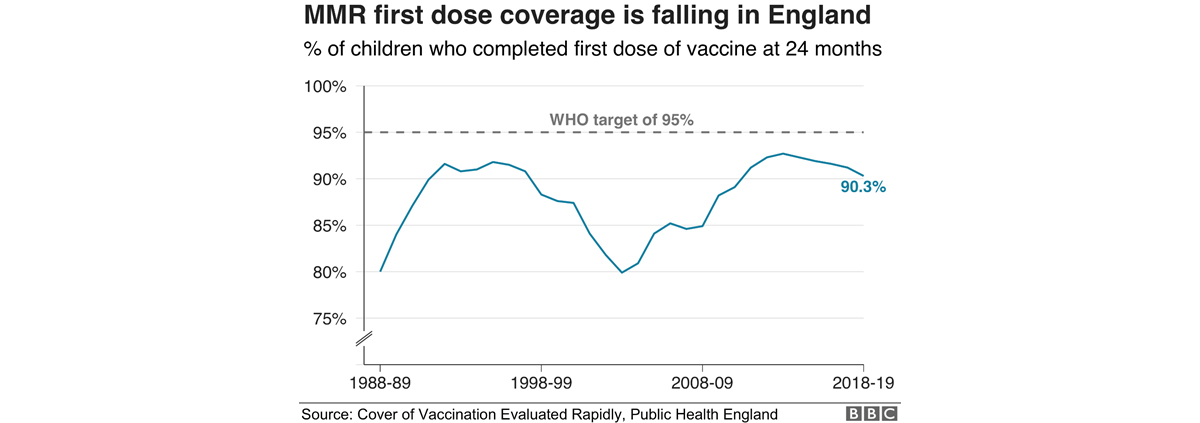Professor Peter Bradshaw
Health Policy
...comments on the concerns that for all the routine childhood vaccinations for the under-fives has fallen in the past year, particularly MMR
“Easily missed amidst the captivating reporting of uncivil Parliamentary behaviour was news that childhood immunisation and effective population coverage is falling below safe levels. Innocuous enough we may think – save for its seriousness – because infectious diseases can be devastating and kill the unvaccinated unnecessarily.
Data from Public Health England show parents are increasingly spurning the protection of their children with Measles, Mumps and Rubella (MMR) vaccination falling from 91.2% to only 90.3% in England – its fifth consecutive year of decline.
Ten vaccines are available throughout childhood giving protection from diseases, such as tetanus, polio and meningitis, but MMR is of greatest importance because measles especially is enjoying a perilous resurgence. The disease is endemic throughout Eastern Europe, France, Germany and Italy with 90,000 cases and 37 deaths. More specifically, the UK experienced 900 cases this year – thus losing of our World Health Organisation (WHO) ‘measles free’ status – something that will take years to retrieve.

MMR is administered in two doses – one just after an infant’s first birthday and then a second dose before school. Yet, the first dose reached 90.3% and only 87.2% of children in England receive a second fortifying dose. Public Health England thus reports 30,000 children entered school this autumn with no protection against measles, mumps and rubella, while 90,000 will have had only the first of the two injections necessary for full protection.
Health Secretary Matt Hancock described the phenomenon as ‘unacceptable’ and such is the gravity of ministerial concern that recently, the problem was brought to the attention of the Prime Minister. Mr Johnson was seemingly keen to consider mandatory vaccination, but was dissuaded because international evidence shows compulsion guarantees neither compliance nor adequate public protection although, it remains a desperate last resort. Rather, the PM focussed on something better understood – namely disinformation or, so called ‘anti-vaxxer propaganda’. Recognising social media as the main impediment to measles prevention, Mr Johnson called for a ‘summit of social media companies’ to discuss how they must stop unscientific fiction concerning vaccination. He further pledged a new comprehensive policy to incentivise GPs to recruit 10-11 year olds to MMR vaccination and those aged 5-25 who have never had a second booster dose.
Measles is in the WHO’s top 10 threats to Global Health. Its prevention through MMR vaccination is proven incontrovertibly to be effective. Yet ‘vaccine hesitancy’ among undecided and questioning parents is the real barrier. It is these parents looking on social media for answers on vaccine safety who are led astray by fake news, untruths, hoaxes, religious and cultural beliefs and sometimes, even threats of violence. It is they also, whose suspicions and forebodings are kept private for fear of censure who are hardest for Public Health Services to reach – all meaning that preventable diseases once thought eliminated are now making a serious comeback.”
Health
Browse all our blogs related to Health.
NHS
Browse all our blogs related to NHS.
Nursing
Browse all our blogs related to Nursing.
